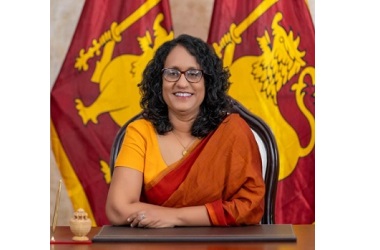 Dr. Harini Amarasuriya was sworn-in as the 16th Prime Minister of the Democratic Socialist Republic of Sri Lanka on 24.09.2024. She was nominated by the National People’s Power coalition to the 9th Parliament of Sri Lanka in August 2020.
Dr. Harini Amarasuriya was sworn-in as the 16th Prime Minister of the Democratic Socialist Republic of Sri Lanka on 24.09.2024. She was nominated by the National People’s Power coalition to the 9th Parliament of Sri Lanka in August 2020.
Dr. Amarasuriya is a prominent Sri Lankan academic, activist, and politician born on March 6, 1970, in Colombo, Sri Lanka. Her multifaceted career spans academia, social activism, and politics, with a focus on youth issues, human rights, and social development.
For the past decade, Dr. Amarasuriya served as a senior lecturer in Sociology at the Open University of Sri Lanka. In addition to her teaching responsibilities and revision of social science curricula, she was actively involved in administrative leadership roles at the University and also served as a Member of the University Grants Commission Standing Committee on Gender Equality and Equity since 2016. She was Secretary of the Open University Teachers Association (2012 & 2013) and the Assistant Secretary (2014 & 2015) and Secretary (2016) of the Federation of University Teachers Association, and was deeply involved in campaigning for increased funding commitments to education within the national budget.
As a researcher, Dr. Amarasuriya has published on elite politics, dissent, social justice, discrimination and social exclusion of youth, women headed households, child labour, institutionalised child-care, early marriage, well-being, education research and intellectual property. In 2014, Dr. Amarasuriya was the lead author on the National Human Development Report for Sri Lanka, and also participated in drafting the National Youth Policy of Sri Lanka that year.
In 2016, Dr. Amarasuriya served as a member of the Public Representations Committee on Constitutional Reforms in Sri Lanka (PRC) which was a Cabinet-appointed mechanism tasked with the first country-wide public consultations on constitutional reform, which were reported to Parliament.
Dr. Amarasuriya received her early education at Bishop's College, Colombo and pursued higher education abroad. She received a Bachelors degree in Sociology from the University of Delhi, and read for a Master of Arts in Applied Anthropology and Development Studies at the Macquarie University, Sydney, Australia where her dissertation was on female migrant workers. In 2011 she wrote her doctoral thesis on child protection in Sri Lanka, and received a PhD in Social Anthropology and International Health and Development from the University of Edinburgh and Queen Margaret University.
Dr. Amarasuriya’s early career involved working with services for community health, social care and inclusion of persons with mental illness, children in state and voluntary children’s homes, certified homes and places of detention, persons living with HIV/AIDS, especially in the districts of Gampaha, Galle, Colombo, Hambantota, Ampara and Mannar.
Dr. Amarasuriya also served for several years on the Boards of Nest, a Sri Lankan community health organization, CENWOR, a research organization working on women and gender issues in Sri Lanka, and Law and Society Trust, a research organization working on law and social issues in Sri Lanka.